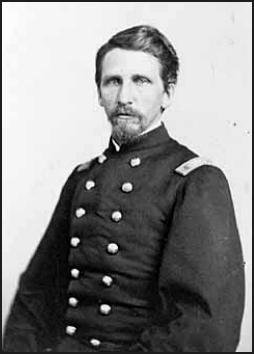Theodore H. Barrett facts for kids
Quick facts for kids
Theodore Harvey Barrett
|
|
|---|---|
 |
|
| Born | August 27, 1834 Orangeville, New York, United States |
| Died | July 20, 1900 (aged 65) Herman, Minnesota, United States |
| Buried | |
| Allegiance | |
| Branch | |
| Years of service | 1862 – 1866 |
| Rank | |
| Unit | 9th Minnesota Infantry Regiment |
| Commands held | 1st Missouri Colored Infantry Regiment |
| Battles/wars | American Civil War
|
Theodore Harvey Barrett was an American soldier who became a Brevet Brigadier General. He led the 1st Missouri Colored Infantry Regiment during the later years of the American Civil War. He is well-known for commanding the Battle of Palmito Ranch, which was the very last battle of the war.
Contents
Early Life and Military Service
Theodore Harvey Barrett was born on August 27, 1834. He grew up in Orangeville, New York. When the American Civil War began, he decided to join the fight.
He enlisted in the Union Army on September 15, 1862. He started as a Second Lieutenant in Company G of the 9th Minnesota Infantry Regiment. This regiment was mainly involved in skirmishes with Native American tribes. Because of this, Barrett did not see much action in the main Civil War battles at first.
Leading the 1st Missouri Colored Infantry
On December 29, 1863, Barrett was transferred to a new unit. He became a Colonel in the 1st Missouri Colored Infantry Regiment. This regiment was part of the Department of the Gulf. They served in Louisiana until June 1864.
After their time in Louisiana, the regiment was ordered to head to Texas. Barrett was recognized for his hard work and loyalty. On March 13, 1865, he was promoted to Brevet Brigadier General. This special rank was given for his "faithful and meritorious services."
The Final Battle of the Civil War
In March 1865, General Barrett arranged an unofficial truce with Confederate forces in Texas. However, this truce did not last long. Barrett sent his troops to raid a Confederate camp. His forces included the 1st Missouri, the 34th Indiana, and the 2nd Texas.
They were trying to raid a camp near Fort Brown. But some Mexican witnesses reported their movements to the Confederates. This led to a few small fights between the Union and Confederate forces.
Battle of Palmito Ranch
The very next day, John "Rip" Ford, a Confederate commander, attacked Barrett's forces. This battle took place at Palmito Ranch. Even though the Confederates won this battle, it was too late. The Civil War was already ending.
Just two weeks after the Battle of Palmito Ranch, Ford's Confederate forces surrendered. This meant the Confederate victory at Palmito Ranch did not change the outcome of the war. It was truly the last battle fought.
Later Life and Legacy
After the war, Theodore Harvey Barrett was officially discharged from the army. This happened on January 19, 1866. He then returned to his home in Herman, Minnesota.
He lived there until his death on July 20, 1900. Theodore Harvey Barrett was buried at Riverside Cemetery in Sterling, Illinois.
Remembering Barrett
A town in Minnesota was named in his honor. Barrett, Minnesota was established in 1887. It serves as a lasting tribute to General Theodore Harvey Barrett.
 | James Van Der Zee |
 | Alma Thomas |
 | Ellis Wilson |
 | Margaret Taylor-Burroughs |

